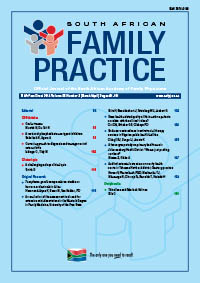Audit of antenatal care at a community health centre in Tshwane North subdistrict, Gauteng province
Keywords:
quality of antenatal care, clinical audit, guideline adherence, maternal health services, primary healthcare
Abstract
Objective: Few studies document the level of compliance with antenatal care protocols in primary health care in South Africa. The aim of this study was to conduct an audit of antenatal care at a community health centre in Tshwane North subdistrict in order to measure the level of compliance of maternity staff with antenatal care protocols. This study was part of a larger study on a quality improvement initiative in primary health care. Design and setting: A retrospective cross-sectional descriptive study was undertaken of women attending antenatal care at the study clinic. Data were collected through a review of the women’s antenatal cards using criteria from the Guidelines for maternity care in South Africa and the basic antenatal care (BANC) checklist. In addition, qualitative interviews of maternity staff were undertaken in order to investigate reasons for noncompliance with the maternity care guidelines. Results: The overall rate of compliance of nurses was 85.1%. This is less than optimal. The response (decision-making and interpretation) component of compliance was only 57.6%. This represents a significant missed opportunity in terms of quality of antenatal care. Important protocols, such as that pertaining to the prevention of mother-to-child transmission (PMTCT) of human immunodeficiency virus, were also not carried out correctly. The response to PMTCT protocols was 50% only, another significant opportunity missed. Administrative factors, patient-related factors and deficiencies in the knowledge and skills of nurses were identified and documented as reasons for noncompliance. Conclusion: The study has provided a detailed picture of the situation with regard to non-compliance with the maternity care guidelines in a primary health care facility. Therefore, these data are very important in terms of quality assurance of maternity services in primary health care.
Published
2013-08-01
Section
Original Research
By submitting manuscripts to SAFP, authors of original articles are assigning copyright to the South African Academy of Family Physicians. Copyright of review articles are assigned to the Publisher, Medpharm Publications (Pty) Ltd, unless otherwise specified. Authors may use their own work after publication without written permission, provided they acknowledge the original source. Individuals and academic institutions may freely copy and distribute articles published in SAFP for educational and research purposes without obtaining permission.

